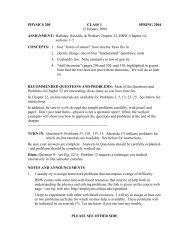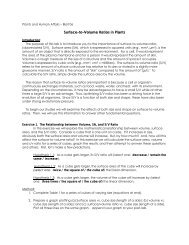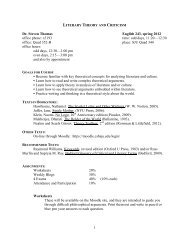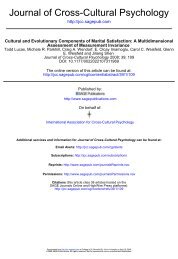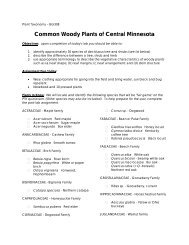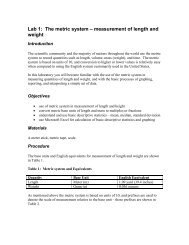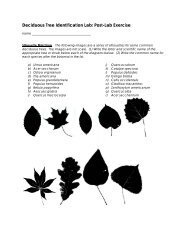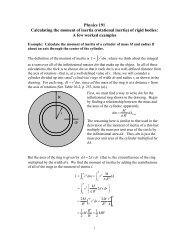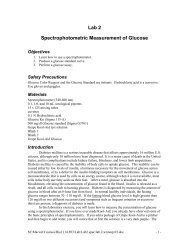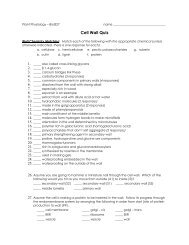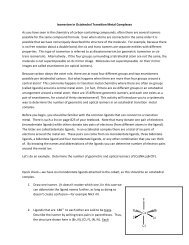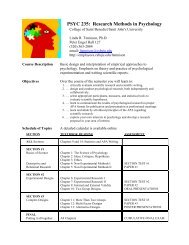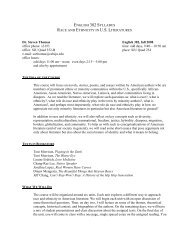Karl Marx Economic and Philosophical Manuscripts of 1844 Wages ...
Karl Marx Economic and Philosophical Manuscripts of 1844 Wages ...
Karl Marx Economic and Philosophical Manuscripts of 1844 Wages ...
Create successful ePaper yourself
Turn your PDF publications into a flip-book with our unique Google optimized e-Paper software.
2526eliminating human labor has it become possible to spinfrom a pound <strong>of</strong> cotton worth 3s. 8d., 350 hanks worth 25guineas <strong>and</strong> 167 miles in length.” [Schulz, p. 62]“On average, the prices <strong>of</strong> cotton goods have fallen by11/12ths over the past 45 years, <strong>and</strong> according toMarshall’s calculations a quantity <strong>of</strong> manufacture costing16s. in 1814 now cost 1s. 10d. The drop in prices <strong>of</strong>industrial products has meant both a rise in homeconsumption <strong>and</strong> an increase in the foreign market; as aresult, the number <strong>of</strong> cotton workers in Great Britain notonly did not fall after the introduction <strong>of</strong> machinery, butrose from 40,000 to 1.5 million. As for the earnings <strong>of</strong>industrial employers <strong>and</strong> workers, the growingcompetition among factory owners has inevitably resultedin a drop in pr<strong>of</strong>its in proportion to the quantity <strong>of</strong>products. Between 1820 <strong>and</strong> 1833, the gross pr<strong>of</strong>it made byManchester manufacturers on a piece <strong>of</strong> calico fell from 4s.1.5d. to 1s. 9d. But, to make up for this loss, the rate <strong>of</strong>production has been correspondingly increased. Theconsequence is that there have been instances <strong>of</strong>overproduction in some branches <strong>of</strong> industry; that thereare frequent bankruptcies, which create fluctuations <strong>of</strong>property within the class <strong>of</strong> capitalists <strong>and</strong> masters <strong>of</strong> labor,<strong>and</strong> force a number <strong>of</strong> those who have been ruinedeconomically into the ranks <strong>of</strong> the proletariat; <strong>and</strong> thatfrequent <strong>and</strong> sudden restriction in employment among theclass <strong>of</strong> wage-earners.” [Schulz, p. 63]“To hire out one’s labor is to begin one’s enslavement; tohire out the materials <strong>of</strong> labor is to achieve one’sfreedom.... Labor is man, while matter contains nothinghuman.” [Pecqueur, pp. 411-12]“The element <strong>of</strong> matter, which can do nothing to createwealth without the element <strong>of</strong> labor, acquires the magicalproperty <strong>of</strong> being fruitful for them [that is, for the propertyowners], as if they themselves had provided thisindispensable element.” [Pecqueur, p. 412]“If we assume that a worker can earn an average <strong>of</strong> 400francs a year from his daily labor, <strong>and</strong> that this sum issufficient for one adult to eke out a living, then anyonewho receives 2,000 francs in interest or rent is indirectlyforcing 5 men to work for him; an income <strong>of</strong> 100,000 francsrepresents the labor <strong>of</strong> 250 men; <strong>and</strong> 1,000,000 francs thelabor <strong>of</strong> 2,500 (300 million—Louis Philippe—thereforerepresents the labor <strong>of</strong> 750,000 workers).” [Pecqueur, pp.412-13]“The property owners have received from human law theright to use <strong>and</strong> abuse the materials <strong>of</strong> all labor—i.e., to doas they wish with them.... There is no law which obligesthem punctually <strong>and</strong> at all time to provide work for thosewho do not own property or to pay them a wage which isat all times adequate, etc.” [Pecqueur, p. 413]“Complete freedom as to the nature, the quantity, thequality, <strong>and</strong> the appropriateness <strong>of</strong> production, the use<strong>and</strong> consumption <strong>of</strong> wealth <strong>and</strong> the disposal <strong>of</strong> thematerials <strong>of</strong> all labor. Everyone is free to exchange hispossessions as he chooses, without any other considerationthan his own interest as an individual.” [Pecqueur, p. 413]“Competition is simply an expression <strong>of</strong> free exchange,which is itself the immediate <strong>and</strong> logical consequence <strong>of</strong>the right <strong>of</strong> any individual to use <strong>and</strong> abuse allinstruments <strong>of</strong> production. These three economicmoments, which are in reality only one—the right to use<strong>and</strong> abuse, freedom <strong>of</strong> exchange <strong>and</strong> unrestrictedcompetition—have the following consequences: eachproduces what he wants, how he wants, when he wants,where he wants; he produces well or he produces badly,too much or not enough, too late or too early, too dear ortoo cheap; no one knows whether he will sell, to whom hewill sell, how he will sell, when he will sell, where he willsell; the same goes for buying. The producer is acquaintedwith neither the needs nor the resources, neither thedem<strong>and</strong> nor the supply. He sells when he wants, then hecan, where he wants, to whom he wants <strong>and</strong> at the price hewants. The same goes for buying. In all this he is at alltimes the plaything <strong>of</strong> chance, the slave <strong>of</strong> the law <strong>of</strong> the



